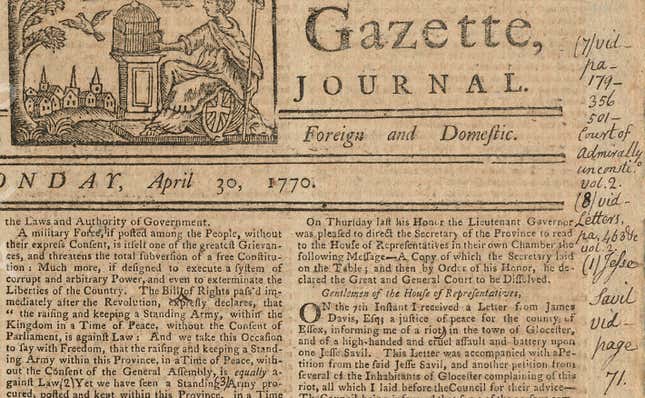Since our launch about 10 months ago, Quartz hasn’t had a way for you to leave comments on our articles. That’s because we didn’t want to bolt an average comments section onto the bottom of each article and call it a day. In our experience, that approach doesn’t often lead to valuable discussion. Plus, we have plenty of other great ways to communicate with you—from our @qz Twitter account to our hi@qz.com inbox.
Today we’re excited to unveil our own spin on comments. We call them annotations. And you can start annotating Quartz right now.
With annotations, you can now add to Quartz stories on the level of individual paragraphs. Just click on the quote bubble off to the right to get started. More instructions are available here.
Think of it like the margins of a book or memo, where the best and most insightful ideas are often found. In the 17th and 18th centuries, it was traditional for newspapers to include space for readers to jot down thoughts, gossip, and observations before passing along their copy to others. Some papers kept their margins wide for such notes; others, like the very first American newspaper, Publick Occurrences, included an entire blank page. Annotations are an extension of that tradition. The margins of Quartz now belong to you.

Annotations are an experiment, and we consider this a beta release of the feature. The idea is to encourage thoughtful commentary and substantive contributions. Because you are annotating a specific paragraph, the discussion ought to be much more directed than usual. We’ll also reward your great annotations by featuring them more prominently, responding to you, and removing others that are off-topic or abusive.
Other websites have been an inspiration to us as we’ve built annotations. Soundcloud allows users to annotate audio; Gawker Media, images; and Medium, text. Rap Genius, originally focused on hip-hop lyrics, has recently expanded its mandate to letting people “annotate everything.” And our own product engineering director, Michael Donohoe, whose team built this new feature, has been toying with these ideas for a while. (Michael has written a piece about how the design and architecture of annotations evolved over time.)
We’d also like to thank Citi for sponsoring the launch of annotations.
We hope you enjoy annotating Quartz and find the feature valuable. We’ll be making changes as we see how people use it, and would appreciate your feedback at hi@qz.com—or just annotate this article! If you’re having trouble with anything, please email support@qz.com. Thanks so much.